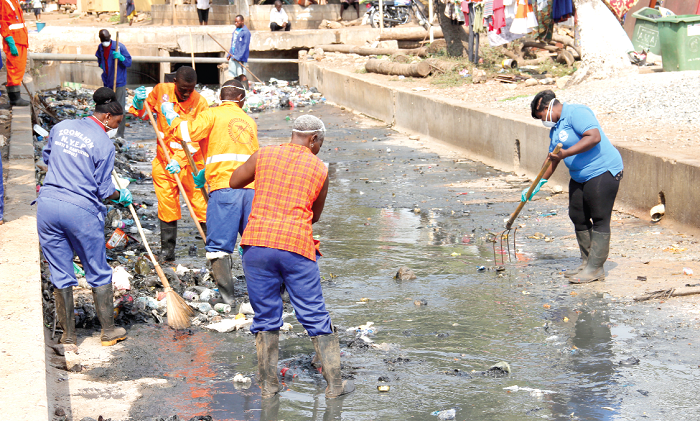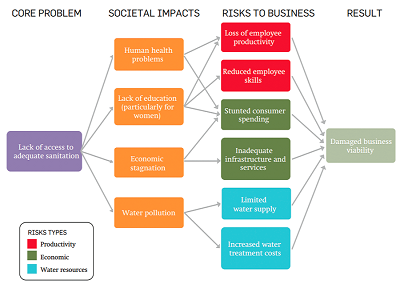
Establish sanitation fund to address financing challenges
The government has been asked to establish a National Sanitation Fund along with clearly developed modalities for its proper utilisation and management.
The Programmes Coordinator of Intervention Forum, a non-governmental organisation, Nana Kwasi Acheampong, said such a fund was needed for the Water, Sanitation and Hygiene (WASH) sector to guarantee adequate and sustainable financing to the sector.
Advertisement
In an interview on emerging issues in the WASH sector, he said an analysis of the budgetary allocation to the sector between 2014 and 2018 showed an average GH¢255.8 million annually, while the actual release over the period had been consistently less than 50 per cent.
He noted that in the period, budgetary allocation increased marginally from GH¢239.9 million in 2014 to GH¢294.4 million and GH¢305.7 million in 2015 and 2016 respectively. This was, however, reduced considerably to GH¢255.5 million in 2017 and further down to GH¢183.6 million in 2018.
“Sanitation sector budget allocation must be increased significantly over a sustained period in line with the eThekwini declaration of up to 0.5 per cent of the Gross Domestic Product (GDP) for basic sanitation and hygiene and the international commitments in the Sanitation and Water for All (SWA) Compact,” he said.

The challenge of poor sanitation in Ghana
According to the Joint Monitoring Programme Report, only 15 per cent of the total population in Ghana have access to improved toilet facility, meaning approximately 25 million Ghanaians do not have access to improved sanitation facilities and safe disposal of human waste.
As a result, approximately 6,000 children die every year due to lack of good sanitation and hygiene which costs the economy approximately €230 million per year, or the equivalent of 1.6 per cent of annual Gross Domestic Product (GDP).
According to Mr Acheampong, Ghana was far from getting its sanitation business right because it could not achieve the Millennium Development Goal (MDG) target of 57 per cent access to basic sanitation services by 2015.
“So the Sustainable Development Goal (SDG) target 6.2 (inclusive sanitation and hygiene for all) seems arduous, particularly now that targeted access is being looked at in terms of “safely managed services” as opposed to “basic sanitation” under the MDGs,” he stated.
A Joint Monitoring Programme (JMP) Report, 2017 on the overall sanitation situation pegs improved sanitation coverage in Ghana at 14 per cent and says that 19 per cent of citizens practise open defecation (OD) across the country.
Indeed, Ghana ranked seventh out of the top 10 hardest places in the world to find a household toilet, ???a WaterAid????, “The State of the World’s Toilets Report 2015”, revealed.
In 2016, the United Nations Children’s Fund (UNICEF) estimated that over 10,000 Ghanaians die each year from water-borne and sanitation-related diseases such as diarrhoea and pneumonia.
Mr Acheampong said a close look at the growth trajectory of the safely managed water service level (2017 JMP Updates and SDG Baseline Report) shows a slow annual improvement.
“The country is not on track to fulfil the SDG target.
If projections from the 2017 Ghana SDGs Baseline Report are to be made based on the four per cent marginal increase recorded in terms of improved sanitation between 2010 and 2015, it might take the country close to a century to achieve the target,” he explained.
Policies and implementation
There exist the Environmental Sanitation Policy (ESP), 2010 and aligned strategy documents such as the National Environmental Sanitation Strategy and Action Plan (NESSAP), 2010, the District Environmental Sanitation Strategy and Action Plan (DESSAP) Guidelines, 2007, the Rural Sanitation Model Strategy (RSMS), 2011 and the Community Water and Sanitation Agency (CWSA) Guidelines, among others.
However, Mr Acheampong said because those policy and strategy documents were developed in the MDGs era, they may not be equipped and ambitious enough for the charge on the SDG target 6.2.
Also, issues of inclusiveness such as gender, persons with disability and climate change are yet to be significantly mainstreamed into them.
He complained that limited progress had been made in respect of implementation due to the under-prioritisation of sanitation and hygiene issues and lack of interventions at the district and local levels.
“Multiple factors can be pointed: weak institutional capacities; inadequate sanitation financing; poor coordination; limited involvement of civil society (traditional authorities, media, CSOs) and citizens in planning, implementation and monitoring processes at all levels; low private sector involvement and investment in the sanitation and hygiene services provision; and inadequate data on sanitation and hygiene,” he cited.

SNV intervention
Intervention Forum, under the auspices of the Netherlands Development Organisation’s (SNV) Voice for Change Partnership (V4CP) programme, is among the civil society organisations (CSOs) embarking on advocacy activities in the WASH sector and focused on increasing equity and access to sustainable and affordable sanitation services and products.
He called for a review of sanitation policies and strategies to make them ambitious enough to achieve the aspirations of the SDGs.
“Greater commitment at all levels to policy implementation is required. Just like in the case of the preparation of the District Medium-term Development Plans, adequate resources and technical support are needed from the national level to ensure that MMDAs prepare and implement their DESSAPs,” he said.
He added that sustained increments in sanitation budget allocations and disbursements with sustainable financing arrangements, and a clearly charted path for roping in substantial investments by the private sector could also go a long way to ameliorate existing financing issues. — GB




